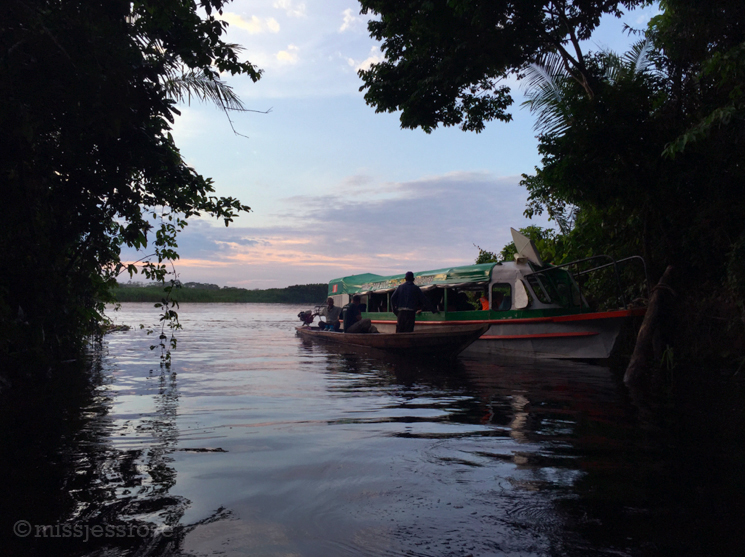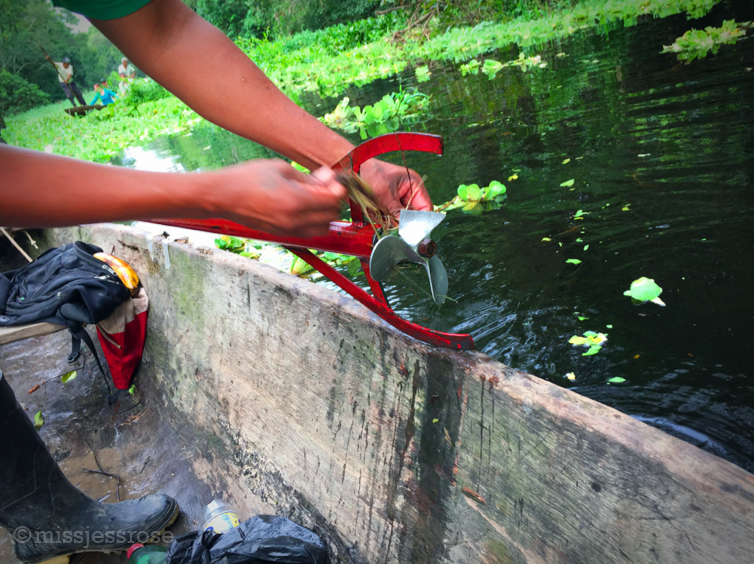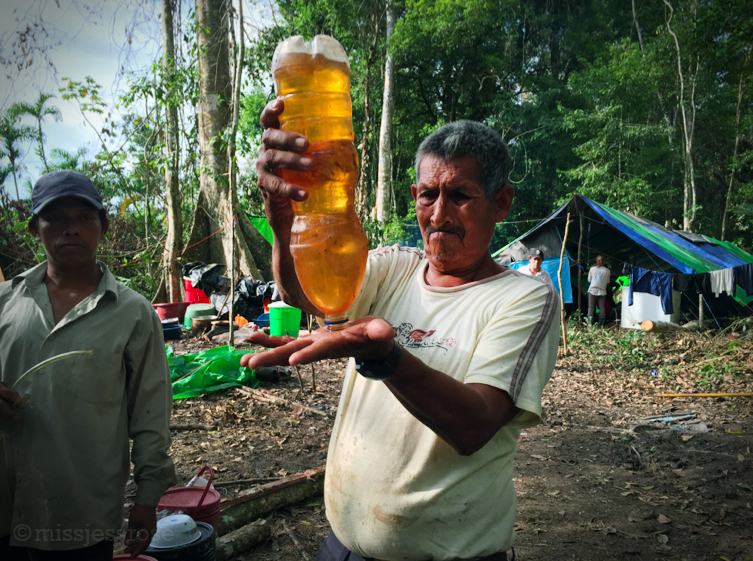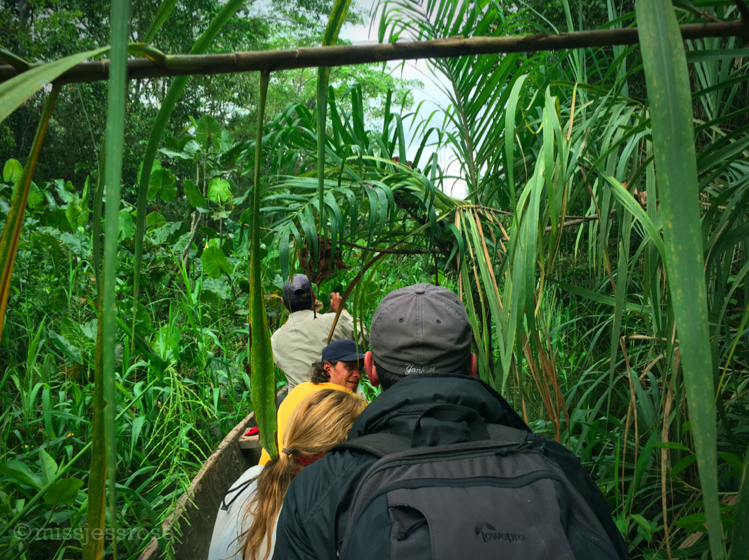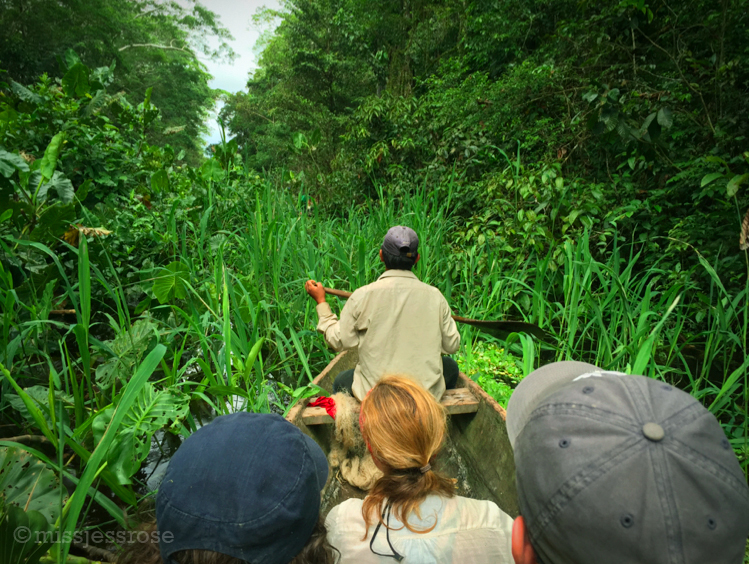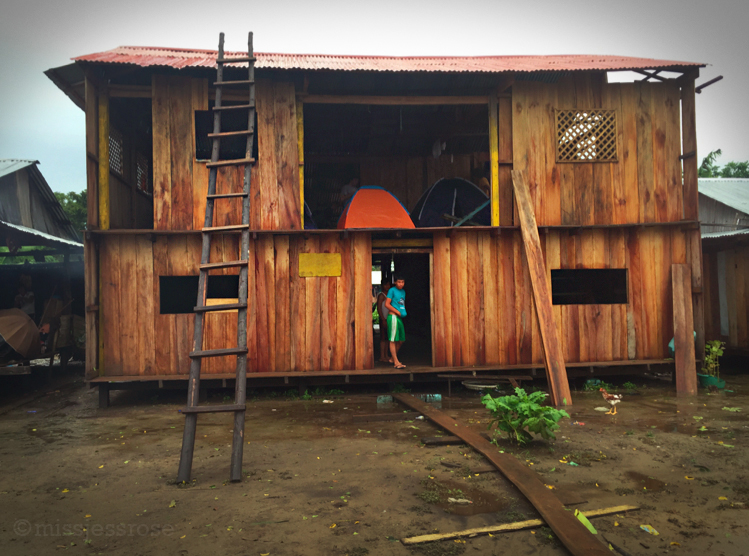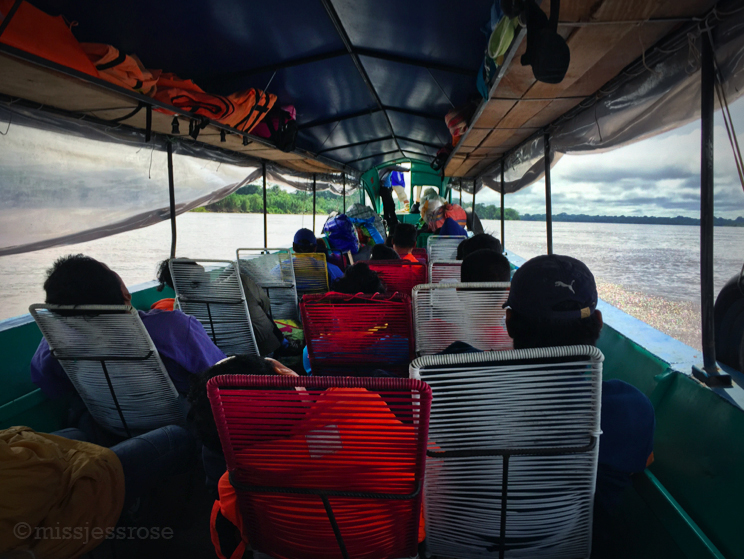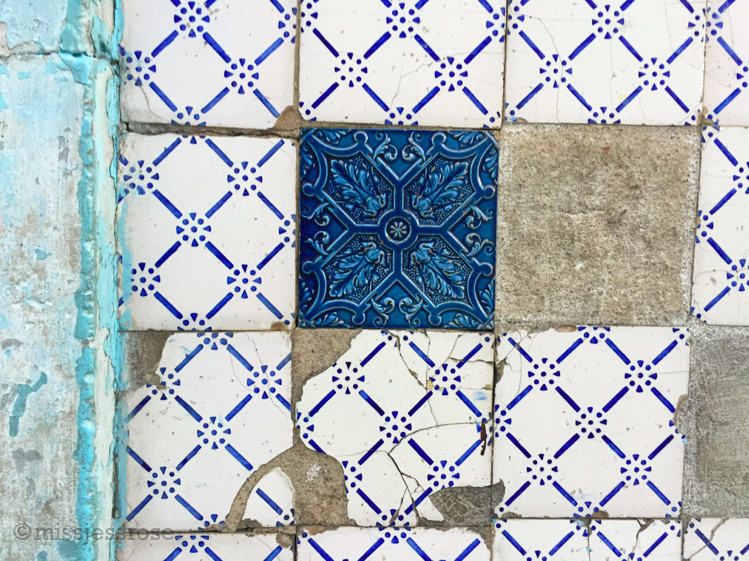We are floating on a giant water salad. Thick, green plants that look like bok choy surround our dugout canoe and stretch infinitely before us on a tributary off the Marañon River in the Peruvian Amazon.
It's day three in the remote jungle. A small group of media makers and environmental and human rights activists are here to document the impact of two recent oil spills in indigenous Kukama territory. While the spill site we visited yesterday was disturbing, today's site promises to be worse — if we make it there.
Stuck in a beautiful but pesky sea of floating water salad.
We are quite obviously stuck in the water salad. The bok choy is thick, wrapping around our metal propeller, impeding our progress entirely. Besides that, I suddenly realize, the Amazonian bok choy is a spider's delight. Our canoe is invaded by black and white creepers and large tarantulas scurry into the greenery.
I should not be surprised. Our guide Anders did warn us that today would be long and hard. In the dark before sunrise, he gave us gringos a serious pep talk: "You will get wet. You will walk far. It may rain. You may walk through deep water. You may fall in." Only later do I realize that we have no concept of what obstacles this journey entails.
We have been battling the water salad for what feels like several hours. By now, two of the three metal propeller fins have broken off after being choked by salad weeds. Worry slowly begins to creep up on me.
Suddenly there's a new problem. Somehow, the motor on our second canoe is accidentally submerged in the river. The gasoline tank floods with water and will not start. Our indigenous guides call back and forth in Spanish trying to problem solve. Spiders continue to crawl. There is nothing to do but sit and wait.
While we wait, I think about how beautiful and alive it is here in the rainforest, with its wacky yellow birds and blue morpho butterflies. Perhaps I've disconnected from the horror of what we aim see — a ten day-old oil spill, crude that hasn't yet been concealed by the oil company with toxic dispersant. I think about the indigenous people who have already been impacted by the spill, how the fish have started dying and how the river water they rely on is now poisoned. I think about the irony of the fact that we are using gasoline engines to power our small canoes in order to visit an oil spill site. And then I think about how absurd it is that we're not more prepared for this water salad nonsense. Why don't we have a machete or a paddle?
***
Like everything on this journey, we somehow manage. After extricating ourselves from this segment of water weeds, it's almost a miracle that an oil worker encampment sits alongside the river.
A wooden platform covered with blue tarp serves as communal sleeping quarters for the workers. I can't imagine sleeping so many nights on such a hard surface. There is one woman in this encampment. Her job is to cook for 30 men. The men arrived a few days ago in order to clear the thick water salad so that boats can reach the fresh spill. This baffles me. How can a company drill in a place so remote without establishing proper access first?
Luckily, the workers have tools. Anders dismantles our motor and syphons out the gasoline water mixture. The motor kicks back to life. I am mystified as to what we might have done were it not for the oil worker's assistance.
We pile back into the canoes and push onward. I have the thought that perhaps we might consider abandoning this mission. But we keep going. Immediately we are right back where we were before, stuck in an infinite sea of spider-infested, inedible salad greens.
***
Oil workers have begun clearing away the water salad creating an open waterway on this segment of the tributary.
Somehow, hours later, we spill out onto clear water. We have come far. The jungle is dense, or rather, it once was prior to being deforested for a helicopter landing pad.
We stop to wander about the slaughtered stumps. I feel like we are about to enter the lion's den and this is just the foreshadowing.
Back in our canoes we make our way down an even smaller, more lush waterway. We have obtained paddles from villagers who were waiting for us here. The oil pipeline runs directly beneath us now.
There are mosquitos. It is terribly humid and hot. We sweat. A Petroperu helicopter passes overhead. The unnatural sound is jarring so far out in the jungle.
Finally, we are forced to stop. It's too dense and giant trees have fallen from the last storm effectively blocking our way. Time to hike, Anders says. We disembark and are eaten alive by mosquitoes and red ants. I feel desperate, panicky, completely miserable.
I'm impatient now. All of us are. It has been a very long, slow day and it feels like evening is coming. At 3pm, it's late. We hike into the jungle, but we stop abruptly. The path is flooded. Anders is clearly worried. He insists we turn back. We are a mere two kilometers away from the spill site.
Back at the canoes a scout says that it's impossible to continue by water. A storm has torn down too many trees and we don't have a chainsaw to clear the way. Daylight is fading fast, and we realize that we are stuck.
It doesn't look good. The film crew is restless, they need to get the shot. Yet it seems our only choice is to abandon mission and head back to San Pedro. There we can discuss the possibility of altering our international travel plans to stay an extra day in order to make a second attempt. Any disappointment I might have had about not making it to the spill site is washed away by my physical discomfort and exhaustion. We are so close, but so far.
Wind gusts through the trees. A storm is coming.
I have the feeling that the Amazon is throwing everything it has at us.
***
Calm before the rainstorm.
The downpour is glorious, for the first hour or so. It's beautiful and complete. But the time it took us to arrive here must be repeated in order to exit. In other words, we face the same long, slow battle with the water salad. This thought exhausts me.
Thunder and lightening are audibly near. There's no sign that the rain will ease. Our canoe fills quickly with water. I start bailing using a cut-in-half plastic soda bottle. Both the bailing and our progress forward are slow.
This is when we get to test our rain ponchos only to discover that pretty much no rain jacket is water repellant in the rainforest. Soon enough, we are thoroughly soaked. We are silent, heads down, working as much as we can to get closer to home and hoping our gear stays dry within the wet bags.
A giant tree has fallen across our path — the next obstacle in this crazy Amazonian video game of life. Luckily an oil worker with a chainsaw is already chopping it apart so that we can pass.
We face the water weeds all over again, this time in the downpour. We get stuck, really stuck. Our leader gets into the water to push us away from a root entanglement. Our propeller breaks again. There is nothing for him to leverage off of, the water is too deep to stand. There are spiders everywhere. It is really raining and we are in the jungle.
***
We huddle under blue tarps with the workers at the same encampment where we fixed our water-logged motor on the way in. The woman gives us bowls of food — salty rice and chicken with canned olives. The workers have a radio, it's scratchy and spotty but they blare static anyways.
Before we reached the encampment, thunder was getting close. Anders was concerned about a lightening strike, so with relief, we stopped. Here beneath the shadowy blues of the tarp, mosquitos devour us.
We wait and wait. There is no sign the rain will let up. When it finally lightens, we take our leave.
Make no mistake, it's still raining, it's just raining less. Which means I'm still bailing the canoe, and we are still drenched.
Back in the water salad, nobody is surprised when we become stuck again. By now, one of the motors has completely died. In a last-ditch effort to extract us from the jungle, Anders instructs all nine of us to climb onto a single canoe. Whereas earlier I might have been skeptical of the safety of this, I am now too exhausted to care. As long as we don't end up in the water with the spider fiesta, I'm all good.
Waterlogged, the canoe sinks with our added weight, but holds us all. Jungle rain is peaceful. We bail water and motor onward as evening comes. Dusk in the jungle is dangerous. It's the time when deadly creepers such as snakes, crocodiles and spiders that kill you with one bite come out for feeding.
***
We are all worn and tired by the time we rejoin our larger boat and head towards San Pedro. Things get dramatic as we debate what to do. Per our original itinerary, we are scheduled to head back to Iquitos tomorrow. Should we change our plans and attempt to visit the spill site again, thus disrupting our schedule, which includes international travel flights for a few of us? Is it safe to try to visit the spill again given the current conditions?
I try to imagine going through everything we just went through one more time and I'm not excited about it. Variables are changing constantly here. I'm skeptical that we would be able to make it through on a second attempt. Being so remote has me mildly on edge should anything go seriously wrong.
Anders sent a few local men on smaller canoes to scout the blocked area and clear fallen trees with chainsaws. Once they return to the village, we'll know more and can make a better decision about what to do tomorrow.
For now, we pitch our tents directly on the hardwood floor of a community home. It's damp and smoke from the kitchen fire wafts upwards. I am so tired, I lay out my sleeping bag and fall asleep instantly, no matter that the floor is uncomfortably hard.
***
I'm roused for a headlamp-illuminated dinner of salty rice and chicken in the form of soup. We discuss our options. Anders' men have returned, but they cannot guarantee that we'd make it through. They were unable to clear the way.
After much deliberation, three of us decide to stay on schedule and catch a boat back while three others stay to make a second attempt at visiting the spill site.
I decide it's too risky and stay on schedule with my coworkers. Besides, I'm not sure I really want to repeat what we just went through.
I will regret this decision later of course.
***
Before dawn departure from San Pedro heading down the Marañon River towards Nauta.
Just before dawn, the river is dark and blue and the rainforest blanketed in white mist. It's beautiful and everything that I love about being in the wilderness. I'm so exhausted I can't sleep. I have crazy regret, fear-of-missing-out for my decision to stay safe and return to the city. But should the remaining team make it, they'll have a grand story fit for a documentary.
***
When the filmmakers rejoin us in Iquitos the next night, they say the oil spill is absolutely horrifying. The San Pedro spill is a thick, black, suffocating blanket spread across a wonder of life. It's a representation of all that is life and all that is death on one messy canvas, only it's real. A toxic nightmare.
The filmmakers too are battle-worn, both physically and mentally, but they tell us their story. They wadded through chest-deep water when fallen trees could not be cleared. They trudged through the jungle to where crude stretched for a mile beyond their sight.
The air was terrible, thick and toxic smelling. They got headaches instantly. Temporary local indigenous workers hired to clean the toxic crude weren't wearing masks. There was a manual bucket brigade to haul oil and dump it into plastic retainer pools. Men lifted piles of black, crude-covered plants by hand and placed them into white plastic garbage bags.
It took the team so long to get into the spill site that they had to return to San Pedro in the dark of night. Crocodiles creeped in the jungle shadows. A deadly spider was spotted on the canoe inches away one of the filmmakers.
As I listen to their adventure, I'm simultaneously relieved and disappointed for not staying on with them.
Extracting oil comes with a high cost, we know this. Mostly that cost is paid for with the lives of people we will never meet, with the sacrifice of places so remote we will never go. But these people and places, they are worth something.
This spill represents dozens more. Drilling for oil in the Amazon has been happening for 40 years. To give you an idea of the impact, over a three year period, a single oil company, Pluspetrol, was responsible for over 90 known oil spills in two blocks covering northern Peru. Nearly three quarters of the entire Amazon rainforest is covered in oil concessions. Both spills we visit along the Marañon happened within the last six months.
I try to process what I did see and what I now know. The magnitude of all that needs to change is bewildering, especially when you're staring at the destructive repercussions of it right in the face. We know that this system is not sustainable, that it will collapse and crumble beneath us, yet we continue with our quest for a finite resource, even in the most precious, remote corners of our planet. I believe we need to fundamentally shift our value system in the West. We need to collectively rethink our definition of progress.
It is so important to understand the complexity of what our society has created, both the good and bad of it. For without knowing the full story, we cannot change the ending.
The heart of an oil spill in the Amazon rainforest.
To see a short video produced after this trip, visit Fusion here.
Watch Gasland director Josh Fox's new documentary, How to Let Go of The World and Love (All the Things Climate Can't Change), which includes footage from this trip.
For more on how you can stop industrial development in the Amazon basin, check out the nonprofit Amazon Watch, an organization working to support indigenous rights and protect the rainforest.


